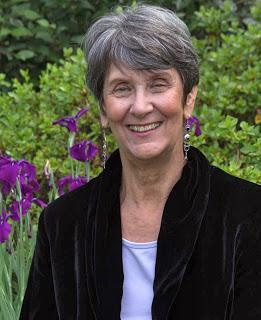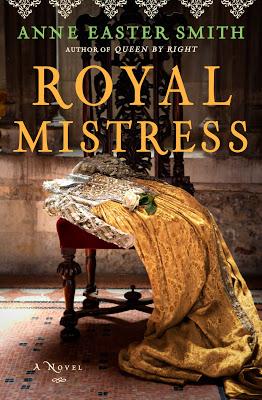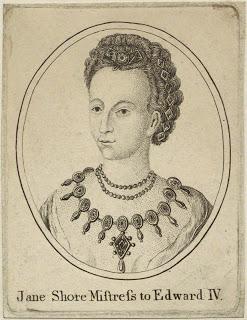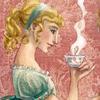 My guest today is Anne Easter Smith. A native of England, Anne spent some of her childhood in Germany and Egypt and the rest at boarding school. She came to the US in the late ‘60s for two years and is still here, living in Newburyport, MA with her husband, Scott. Anne is the author of five novels about the York family in the Wars of the Roses, all published by Touchstone at Simon & Schuster. She has been a secretary, a PBS auction coordinator, the features editor at a daily newspaper, a folksinger and the administrator at a music school. When she is not writing, Anne is usually to be found either acting or directing in community theater productions, beach-walking, practicing yoga, or watching “Mad Men.” Her latest novel, Royal Mistress has just been published and she's here today to share her passion for history, the Ricardian cause and writing with us. Join me and welcome Anne at FLY HIGH!
My guest today is Anne Easter Smith. A native of England, Anne spent some of her childhood in Germany and Egypt and the rest at boarding school. She came to the US in the late ‘60s for two years and is still here, living in Newburyport, MA with her husband, Scott. Anne is the author of five novels about the York family in the Wars of the Roses, all published by Touchstone at Simon & Schuster. She has been a secretary, a PBS auction coordinator, the features editor at a daily newspaper, a folksinger and the administrator at a music school. When she is not writing, Anne is usually to be found either acting or directing in community theater productions, beach-walking, practicing yoga, or watching “Mad Men.” Her latest novel, Royal Mistress has just been published and she's here today to share her passion for history, the Ricardian cause and writing with us. Join me and welcome Anne at FLY HIGH!
 Welcome to my little corner of the blogosphere, Anne. It’s a pleasure and an honor to have you as my very special guest on FLY HIGH!
This is my first question. I know you love quoting Rudyard Kipling with his “If history were taught in the form of stories, it would never be forgotten." Does that mean we can learn the truth about our past and roots reading historical novels more than or as well as researching on documents?
Welcome to my little corner of the blogosphere, Anne. It’s a pleasure and an honor to have you as my very special guest on FLY HIGH!
This is my first question. I know you love quoting Rudyard Kipling with his “If history were taught in the form of stories, it would never be forgotten." Does that mean we can learn the truth about our past and roots reading historical novels more than or as well as researching on documents?
I wouldn’t say that! Of course you will gain far more by reading the chronicles, letters and histories of the period. But what historical fiction does is bring those people to life and perhaps give you an appetite for doing more research on your own. However, just like watching a bio-pic on TV -- you shouldn’t believe everything you see. I try very hard never to have a person in the wrong place at the wong time--I will do my best to see if there is any evidence that someone was or was not at a certain castle when I want them to be, but I will not mess with history. If I cannot find anything that says Cecily Neville never met Joan of Arc, but the research tells me these two women were in the same building at the same time (one in the royal apartments and the other in the dungeon) then I feel it’s plausible that they did meet. As a reader of Historical Fiction, I think you have to learn to recognize a writer who respects the history rather than one who, with one obvious anachronism, can have me throwing a book across a room! If you question something in an historical novel, then go and seek out the truth in the non-fiction shelves. Fiction is fiction after all!
In your opinion, what are a historical fiction writer main task and talent ?
I’ve almost answered this good question above! A love of research is key; be a seeker of truth and if you need to bend it for dramatic license make sure you own up to that in a Author’s Note. As a writer of historical biography, I think my responsibility is to be true to the people I choose as my main characters. Do not misrepresent them if there is no evidence in history of your characterization. I like to think that I make history so palatable and accessible that readers will want to rummage in the archives and chronicles for themselves and find out more. When and how did you come to be fascinated by the Middle Ages? Ever since I was a little girl having fantasies or daydreams I was always in a long dress running through castles and gothic cathedrals. Don’t tell anyone but I still have them! I saw films like “Ivanhoe,” “Robin Hood” and “King Richard and the Crusaders” (very old!!) and read a book called “The Woods of Windri” by Violet Needham when I was 10 and I was hooked.
What is it that most appeals to you of that distant era?
That it wasn’t like today. I’m one of those who lives in the past (like sci-fi and fantasy readers live in the future) and I yearn for when life did not race by in frightening fashion. I like to imagine what it must be like to have total silence and darkness at night once your village or town went to bed. There is never total silence in towns today--the street lights stay on, cars roll by all night, your air-conditioner or heater hums, the phone sometimes rings, someone down the street has his TV volume too high, etc. Of course I’d want to be be a male in that period; it would be dirtier; in some ways more brutal--although after the Boston bombing (only 30 miles from me) and 9/11, I’m not sure; and diseases were terrifyingly unhealable, but you wouldn’t fear the possibility of the destruction of the whole world like we can now. I too tend to live in the past more than in the present as a teacher of English literature as well as a fond reader of historical fiction and watcher of costume drama/movies. You do the same as an author dedicated to research and to write about the past. What I’d like to know from you is, do the lessons we get from the past more alienate us from reality or more help us to face it?
I wish more people would consult history--especially in our government. I’ve just learned from an erudite friend in Portugal that Washington State University has a research team on historical cycles that is tentatively building a theory that as living memory fades every three generations, humankind repeats the big disasters every 80 years. So I guess no, we don’t learn! (And in 20 years it will be the anniversary of WWII. Yikes!) You are a member of the Richard III Society and your novel A Rose for the Crown is your own personal revision of the last Plantagenet king of England, Richard III . When and how did you become a Ricardian questioning Shakespeare’s portrait of Richard III? I learned in English boarding school that we had Good Kings and Bad Kings. King John and King Richard III were pretty much The Bad Kings. And I bought it, especially after my history teacher related in gory detail how Richard murdered his adorable little nephews in the Tower. Well, at age 21, my godmother (a staunch Ricardian I found out) gave me Jospehine Tey’s Daughter of Time and I was gobsmacked. Her conclusion was that Richard didn’t murder those cuties, Henry VII (his successor) did. I began to read everything I could get my hands on about Richard, and I’ve become a pretty good expert on him and the Wars of the Roses. Okay, I’ll ‘fess up -- that is 50 years of research! You work it out.
 Can you tell us about your own characterization of King Richard III in A Rose for the Crown?
Can you tell us about your own characterization of King Richard III in A Rose for the Crown?
As you rightly say above, my portrayal of Richard in A Rose for the Crown is revisionist, but I don’t think I make him out to be a saint. I’d rather talk about the Richard I had to portray in Royal Mistress and how incredibly difficult it was so really look at him through the eyes of a couple of people whom Richard did not treat well. Perception is reality, and whoever is doing the perceiving colors the perceived’s character. Luckily, by using omniscient narration (you are in everyone’s heads) in Royal Mistress for the first time, I was able to provide a rational explanation for Richard’s actions by seeing the situation through his eyes as well. He may not be the gentle, enigmatic young man of A Rose for the Crown, but I hope I have made him a complex, troubled man who was staying true to his staunch beliefs in God, in family and in duty.
An aspect of his personal history I’m interested in is his marriage to Anne. What do you think about it? Was it for convenience, was it for love and devotion?
My own feeling is that love grew in their marriage. They seemed to be happy together and he enjoyed living away from the intrigues of the court for most of his married life and hunkered down in Middleham, way up north, with Anne and their son. Of course I really believe in my character Kate Haute from A Rose for the Crown. I created her because we do not know with whom Richard had his two bastard children. I think he took his motto “Loyalty Binds Me” seriously enough to give up whomever he had sired the children with to live a faithful life with Anne. That says a lot about his character, I think. Anne has never particularly intrigued me as a character--came across to me as wishy-washy, and that’s why I cast about for another woman to tell Richard’s story in my first book. Sorry if I disappointed you! Are you a big Anne fan?
 Well, I actually hit it off with the portrait Sharon Kay Penman did of her in The Sunne in Splendour, but historical records don't tell us much about her. So I maybe have a very romantic but deeply unrealistic image of her in my mind. Let's move to another topic. Royal Mistress, your latest novel which has just come out yesterday, May 7th, tells the story of Jane Shore. She’s another fascinating figure dating back to Richard’s brother reign, she was in fact Edward IV’s mistress. Why did you decide to make her the heroine of your new book?
Well, I actually hit it off with the portrait Sharon Kay Penman did of her in The Sunne in Splendour, but historical records don't tell us much about her. So I maybe have a very romantic but deeply unrealistic image of her in my mind. Let's move to another topic. Royal Mistress, your latest novel which has just come out yesterday, May 7th, tells the story of Jane Shore. She’s another fascinating figure dating back to Richard’s brother reign, she was in fact Edward IV’s mistress. Why did you decide to make her the heroine of your new book?
My four other books about the York family in the Wars of the Roses have featured a female protagonist (that’s because I’m not really sure how men think!). I have always loved medieval women--they were strong and inasmuch as they could be in the time, they were independent. When Englishmen left home and went on crusades or fighting for the crown or their possessions in France--sometimes for years, who do you think ran the homes, businesses, farms and castles? Once England lost all its territory in France, settled into the Tudor and subsequent dynasties, women once again took a back seat. So I set about telling Edward’s and William Hastings’s stories through the eyes of a woman the two best friends both loved, Jane Shore. As with A Rose for the Crown, I loved being back with a non-royal protagonist and setting the book almost exclusively in London. London is virtually my hometown (if you don’t count being born in Hampshire, raised in Germany and Egypt until I went to boarding school). Both my parents were Londoners and my sister and brother live there still. Jane has not had a novel written about her since Jean Plaidy’s “The Goldsmith’s Wife” (which we now know is an erroneous moniker--she was a mercer’s wife) in 1970s, so I decided to write one for the 21st century. How would you present Royal Mistress to our reader in about 50 words?
Jane Shore was King Edward IV’s favorite and final mistress. The story of her rise and fall is so dramatic--as is the period and place in which she lived --that playwrights, poets and balladeers have told it down the centuries. It would make a damn fine film! I can’t wait to read it! Thanks Anne, that’s all. I’m really grateful to you for taking the time to answer my questions.
My pleasure indeed!

